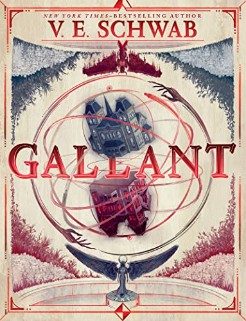The master of the house stands at the garden wall.
It is a grim stretch of stone, an iron door locked and bolted at its center. There is a narrow gap between the door and the rock, and when the breeze is right, it carries the scent of summer, sweet as melon, and the distant warmth of sun.
There is no breeze tonight.
No moon, and yet he is bathed in moonlight. It catches the edges of his tattered coat. It shines on the bones where they show through his skin.
He trails his hand along the wall, searching for cracks. Stubborn strands of ivy follow in his wake, questing like fingers into every fissure, and nearby a bit of stone breaks free and tumbles to the ground, exposing a narrow slice of someone else’s night. The culprit, a field mouse, scrambles through, and then down the wall, over the master’s boot. He catches it in one hand, with all the grace of a snake.
He bends his head to the crack. Fastens his milk-white eyes on the other side. The other garden. The other house.
In his hand, the mouse squirms, and the master squeezes.
“Hush,” he says, in a voice like empty rooms. He is listening to the other side, to the soft chirp of birdsong, the wind through lush leaves, the distant pleading of someone in their sleep.
The master smiles and picks up the bit of broken rock and nestles it back into the wall, where it waits, like a secret.
The mouse has stopped squirming in the cage of his grip.
When he opens his hand, there is nothing left but a streak of ash and rot and a few white teeth, little bigger than seeds.
He tips them out onto the wasted soil and wonders what will grow.
Chapter One
Rain drums its fingers on the garden shed.
They call it a garden shed, but in truth there is no garden on the grounds of Merilance, and the shed is barely even that. It sags to one side, like a wilting plant, made of cheap metal and moldering wood. The floor is littered with abandoned tools and shards of broken pots and the stubs of stolen cigarettes, and Olivia Prior stands among them in the rusted dark, wishing she could scream.
Wishing she could turn the pain of the fresh red welt on her hand into noise, overturn the shed the way she did the pot in the kitchen when it burned her, strike the walls as she longed to strike Clara for leaving the stove on and having the nerve to snicker when Olivia gasped and let go. The white-hot pain, the red-hot anger, the cook’s annoyance at the ruined mash, and Clara’s pursed lips as she said, “It couldn’t have hurt that much, she didn’t make a sound.”
Olivia would have wrapped her hands around the other girl’s throat right there if her palm weren’t singing, if the cook weren’t there to haul her off, if the gesture would have gained her more than a moment’s pleasure and a week’s punishment. So she’d done the next best thing: stormed out of the stuffy tomb, the cook bellowing in her wake. And now she’s in the garden shed, wishing she could make as much noise as the rain on the low tin roof, take up one of the neglected spades and beat it against the thin metal walls, just to hear them ring. But someone else would hear, would come and find her, in this small and stolen place, and then she’d have nowhere to get away.
